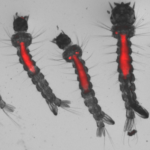Lien vers Pubmed [PMID] – 30973141
Lien DOI – 10.1051/jbio/2019003
Biol Aujourdhui 2018 ; 212(3-4): 119-136
Mosquitoes (Diptera: Culicidae) are found worldwide. Around 100 among 3500 mosquito species are known to be vectors of parasites and viruses, responsible for infectious diseases including malaria and dengue. Mosquitoes host diverse microbial communities that influence disease transmission, either by direct interference or via affecting host immunity and physiology. These microbial communities are present within diverse tissues, including the digestive tract, and vary depending on the sex of the mosquito, its developmental stage, and ecological factors. This review summarizes the current knowledge about the mosquito microbiota, defined as a community of commensal, symbiotic or pathogenic microbes harboured by a host. We first describe the current knowledge on the diversity of the microbiota, that includes bacteria, fungi, parasites and viruses and on its modes of acquisition throughout the mosquito life cycle. We then focus on microbial interactions within the mosquito gut, which notably affect vector competence, and on host-microbe interactions affecting mosquito fitness. Finally, we discuss current or potential methods based on the use of microbes or microbial products to interfere with pathogen transmission or to reduce mosquito lifespan and reproduction.

